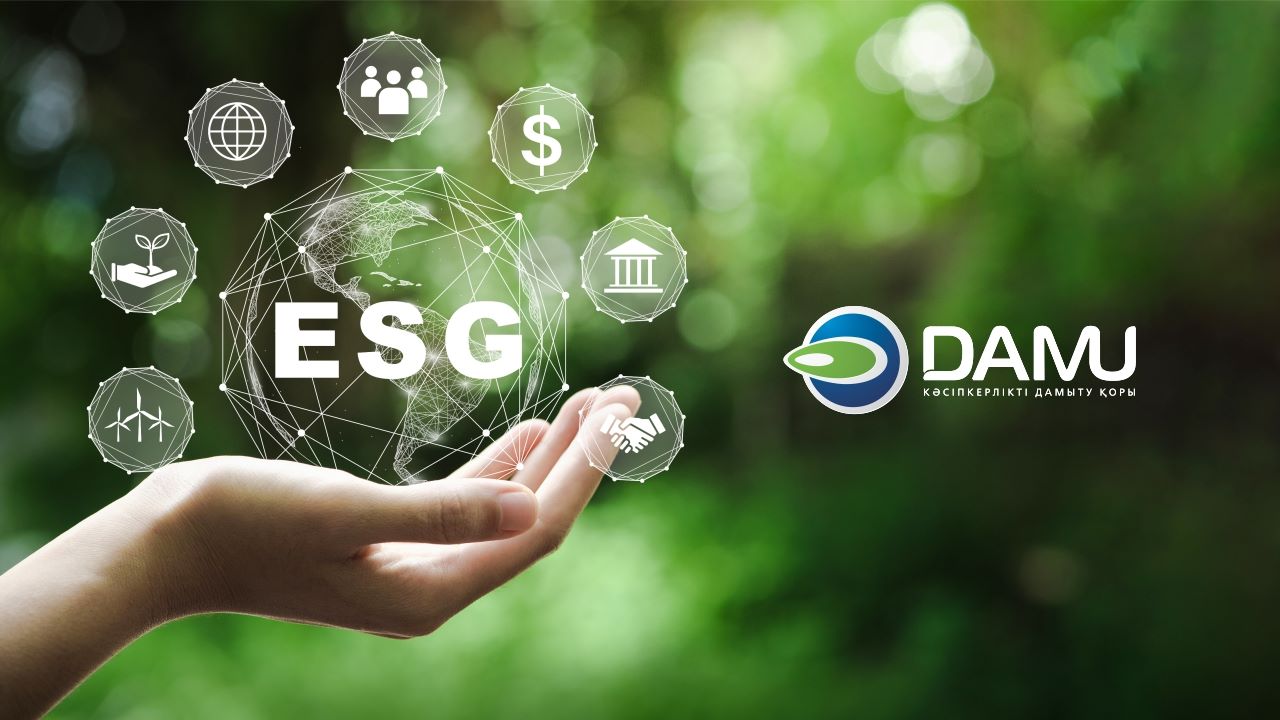
Get consultation!

Environmental criteria |
Social criteria |
Corporate governance |
|---|---|---|
energy consumption and energy saving |
social positioning of the organization |
compliance with best business practices |
removal and recycling of waste |
relationships with employees, clients, suppliers |
transparency and independence in decision-making |
greenhouse gas emissions into the atmosphere during production, consumption and transportation |
legal protection and social security of employees |
meeting the expectations of shareholders |
environmental risks affecting operations and other |
||
Every company uses energy and resources, and every company impacts and is impacted by the environment. |
Every company operates within a larger, more diverse society. |
Every company that is a legal entity needs to be managed. |

Sustainable development is becoming an increasingly relevant topic and is an integral part of the global agenda. Gradually, there is a reassessment of values, where the fight against environmental pollution, discrimination and corruption come to the fore. Therefore, new requirements for the activities of companies and the principles of ESG (environmental, social and corporate governance) management have appeared.
Already now, large Kazakhstani and international companies that have approved their corporate ESG strategies, have begun to review their suppliers and contractors for sustainability and compliance with ESG principles, in order to achieve their goals.
Also, according to KASE, many large Kazakhstani companies are implementing ESG principles in their activities in order to attract foreign financing and bring their products to foreign markets. Kazakhstani companies try to adhere to the standards and criteria followed by their international partners and investors.
Thus, those representatives of small and medium-sized businesses that are already today the first to begin implementing ESG in business processes will receive the benefits of working with large clients on a long-term basis.
For example, in Germany, the Act on Due Diligence in Supply Chains has been in effect since 2023 - in parallel with a similar document operating at the level of the entire European Union. It obliges companies to audit suppliers for compliance with human rights and care for the environment. Thus, a business that does not meet ESG standards loses access to clients. “Changes are coming for small and medium-sized businesses, whether they want them or not,” concludes United Nations Global Compact CEO Sanda Ojambo.

According to the ARFM, these measures will have a positive impact on increasing the investment attractiveness of Kazakhstan and will contribute to the growth of social and environmental responsibility of companies.
For example, the number of green companies is already growing in Jusan Bank and in the future they plan not to issue loans to all companies if they do not follow ESG principles. The bank also began working on a mechanism for assessing borrowers taking into account social and environmental risks in order to issue green loans to SMEs at low rates in the future.
In Russia, almost a third of the top 20 banks have already introduced ESG metrics in their lending and investment processes, and another 20% are planning to do so. Russian banks can adjust the terms of loans and other products depending on the level of ESG development of the company.
It is believed that companies that disclose information about environmental, social and governance initiatives can attract more investment and revenue by strengthening their reputation in the eyes of shareholders, clients and partners.
Therefore, it is already recommended that Kazakhstani SMEs implement ESG principles in their companies in order to be competitive, attract investment and reduce production costs.

Cost Reduction
Cost optimization and resource conservation are becoming increasingly important issues for businesses given rising raw material costs and the real cost of water or carbon. Implementing ESG practices can help reduce waste, improve energy efficiency, or comply with local environmental regulations, which can save a company money in the long run.
McKinsey research analyzing resource efficiency (the amount of energy, water, and waste used relative to revenue) in different companies has shown a correlation between resource efficiency and financial performance. The result is that with the full implementation of a sustainable development strategy, operating profit can be increased by approximately 60%.
For example, FedEx intends to convert its entire fleet of 35,000 vehicles to electric or hybrid engines. By converting 20% of its vehicles, the company was able to reduce fuel consumption by more than 50 million gallons.
The Russian company Rusal sends about 67% of its production waste for recycling on its own or sells it as raw materials to other industrial enterprises. Thanks to this program, Rusal receives additional revenue of several tens of millions of dollars. In general, closed-loop production allows you to save and earn money, ensuring rational use of resources.
Another Russian furniture company, Tri Divana, uses durable wood and monitors the quality of the product so that one chair can be used by at least two generations. Before implementing ESG practices, the company threw all its waste into a common bin of eight cubic meters and overpaid for waste removal. The container contained a lot of cardboard and large wood scraps: half of the capacity was air. Now the company sorts the waste, compactly folds the waste paper and sells it. It turns the wood scraps into sawdust and makes cheaper furniture from chipboard. Thus, the company optimized its operational processes to use raw materials economically.
In conclusion, it can be said that less waste can often be the result of more efficient production processes, increased efficiency and reduced costs for storing and processing excess waste.
Investment Attractiveness
Global investment in sustainable development in 2019 exceeded US$30 trillion, up 68% since 2014 and 10 times more than in 2004. This acceleration has been driven by increased attention from society, governments and consumers to the broader impact of corporations, as well as investors and executives who understand that a strong ESG proposition can ensure a company’s long-term success.
With the growing interest in sustainable projects, ESG implementation allows SMEs to attract more investment. Investors see the potential for stable growth and reduced risks associated with environmental, social and governance factors in the company.
According to Freedom Broker research, demand for investments in companies adhering to ESG principles is growing. From January to November 2021, ESG-focused funds around the world attracted a record $649 billion. For comparison, in 2020, investors invested $542 billion in them, and in 2019 - only $285 billion. At the same time, ESG now accounts for about 10% of all assets in global investment funds. If measured in money, then, according to various estimates, the ESG market accounts for between $35 trillion and $46 trillion.
Many European funds and funds in North America seek to invest only in companies that adhere to ESG principles, due to the high demand of the population for environmental friendliness.

Kazakhstani entrepreneurs implementing sustainable development principles in their projects can take advantage of state and international programs to support “green” projects.
For example, the Damu Entrepreneurship Development Fund provides financial support through interest rate subsidies and loan guarantees within the framework of the Unified Comprehensive Program (formerly the National Entrepreneurship Development Project), programs implemented jointly with UNDP in the field of energy efficiency and renewable energy, as well as within the framework of projects with international financial institutions such as the European Bank for Reconstruction and Development, the Asian Development Bank and others.
At the same time, according to the approved Strategy for Achieving Carbon neutrality of the Republic of Kazakhstan until 2060 (Decree of the President of the Republic of Kazakhstan dated February 2, 2023 No. 121) the state will take priority measures to support the development and implementation of corporate strategies in the form of connecting to the "green" taxonomy, the database of best available technologies and mechanisms of special economic zones.
Employee Attraction and Productivity
Implementing ESG and a well-designed Sustainability Strategy will help companies attract and retain quality employees, increase employee motivation and improve overall productivity.
Lloyds Bank believes that environmental values positively boost employee morale, which leads to employee retention.
A study by the British job search site TotalJobs showed that 28% of British workers pay attention to a company’s environmental policy when applying for a job, and among millennials this figure rises to 39%.
Therefore, if a company has “green” initiatives, it can attract employees in the form of like-minded people who will help the company implement environmental methods, this can also lead to the emergence of new processes in work and new products - and all this can potentially increase efficiency, open up alternative markets, attract new clients, and can also contribute to the further development of the company.
It is necessary to remember that companies that provide competitive salaries, pay attention to the comfort and safety of employees, have a transparent career development system, and also provide the opportunity for professional and personal training of employees, will always be perceived as an attractive place to work for highly qualified specialists.

Supply Chain Requirements
Global companies committed to sustainability goals not only adhere to ESG principles in their operations, but also seek to select suppliers that align with their principles.
For example, Interface, a flooring manufacturer, has made its products not only carbon neutral throughout their life cycles, but is also transforming its supply chains to reverse global warming. While Walmart tracks the working conditions of its suppliers, including those with extensive factories in China, according to the company's own scorecard.
Mars thinks not only about its own operations, but also about its suppliers and the environment. Mars has developed dedicated farms that implement new technology initiatives for farmers in supply chains and expand farmers' access to capital so they can have a financial stake in these initiatives.
In general, it would be useful for companies to implement ESG practices if they have not already done so, given that in 2023 Kazakhstan approved the Strategy for Achieving Carbon Neutrality of the Republic of Kazakhstan until 2060 (Decree of the President of the Republic of Kazakhstan dated February 2, 2023 No. 121), which provides for the broad involvement of stakeholders at all levels of decision-making to achieve the goal, including representatives of central and local authorities, the quasi-public sector, science, business (associations and enterprises), non-governmental organizations and local communities.
In conclusion, I would like to note that the implementation of ESG principles and the development of a strategy allows SMEs to create a more effective business management system, see their risks and opportunities and improve financial and economic performance (reducing energy consumption costs, establishing efficient production processes, economical and reasonable use of raw materials and processing), as well as becoming a more attractive company for investors and banks, taking advantage of government measures support and start working with large organizations for which sustainable development has become an integral part of their work.
Studying and applying the best practices of international experience provides an opportunity for Kazakhstani companies to keep up with the times, apply new technologies, attract like-minded people and advanced specialists, which will also further provide positive dynamics for the growth and development of the company.
*It should be noted that this information is intended for informational purposes only and does not constitute legal, financial or other professional advice.